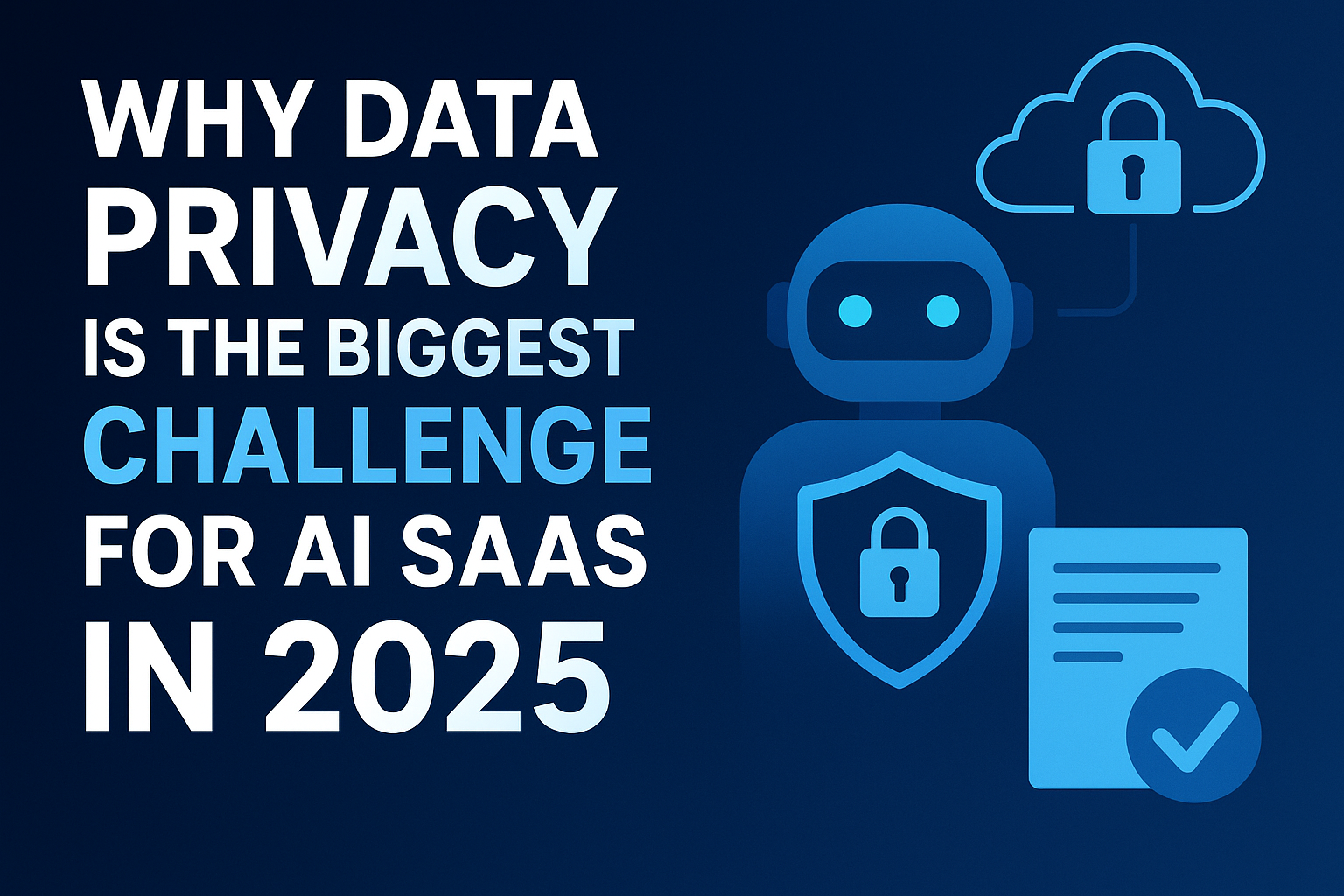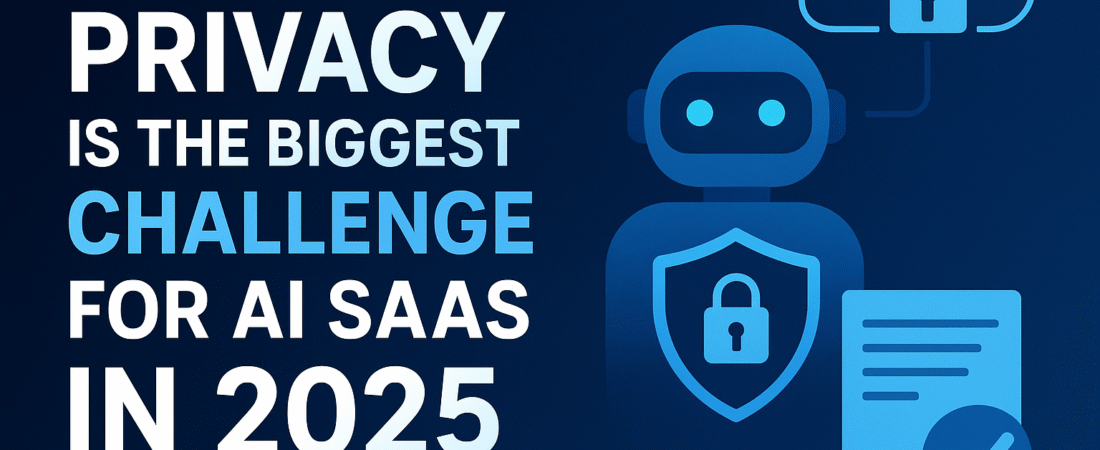
Why Data Privacy Is the Biggest Challenge for AI SaaS in 2025
Introduction: The Double-Edged Sword of AI SaaS
AI-powered SaaS tools have significantly transformed the way businesses operate in 2025. From AI-driven project management tools that automate workflows to AI-powered assistants that draft reports, analyze customer data, and even suggest strategies, these tools are now central to business growth.
But with this innovation comes a heavy burden: data privacy. Every interaction with AI SaaS involves sensitive company data, including emails, contracts, financial records, and customer details, which are processed and sometimes stored in ways that businesses can’t fully control.
The convenience of AI SaaS is undeniable, but the hidden risk of data exposure has become the number one challenge for companies worldwide.
Why Data Privacy Matters More Than Ever
The Rise of AI in Everyday SaaS
AI is no longer an “add-on” feature; it’s built into SaaS products at the core. Tools like Hostinger Horizons AI app builder, Jasper AI, and ClickUp AI are handling vast amounts of sensitive information, making security a top concern.
Sensitive Business and Customer Data
Unlike traditional SaaS, AI SaaS tools not only store data but also learn from it. When you feed your customer service logs, financial sheets, or legal contracts into an AI, you’re trusting that it won’t leak or misuse that data.
Global Regulatory Pressure
With privacy laws like GDPR (Europe), CCPA (California), and the upcoming EU AI Act, businesses face massive penalties if they mishandle data via third-party AI SaaS vendors.
The Key Data Privacy Risks in AI SaaS
1. Data Leakage During AI Training
Some AI SaaS providers may use client data to improve their models. While vendors promise “anonymization,” breaches have shown that de-anonymized data leaks are possible.
2. Shadow IT & Unmonitored SaaS Usage
Employees often use AI SaaS tools without IT approval, uploading confidential information into unknown platforms, a recipe for security disasters.
3. Vendor Lock-In and Cloud Dependency
Most AI SaaS tools run on major cloud providers (AWS, Google Cloud, Azure). This means data security depends not only on the SaaS vendor but also on the underlying cloud infrastructure.
Compliance Challenges for AI SaaS in 2025
GDPR, CCPA, and Emerging AI Laws
Regulators demand explicit consent, data deletion rights, and transparency about how data is processed. Many AI SaaS vendors still lag in compliance readiness.
The AI Act in Europe
The EU AI Act, expected to take full effect in 2025, places stricter rules on high-risk AI applications, requiring vendors to show how data is used and provide explainability.
Industry-Specific Compliance
-
Healthcare SaaS must comply with HIPAA.
-
Finance SaaS faces SEC and FINRA data rules.
-
Legal SaaS must guarantee attorney–client privilege protections.
Case Studies: AI SaaS Privacy Controversies
ChatGPT Enterprise & Data Retention Concerns
Even though OpenAI now promises enterprise-grade privacy, earlier controversies around ChatGPT retaining user inputs made companies wary.
Zoom AI Features Backlash
Zoom faced backlash in 2023 when users realized training AI on meeting data was part of its terms of service. This shook customer trust in AI-powered SaaS.
Microsoft Copilot & Enterprise Security Fears
Microsoft’s Copilot raised concerns about sensitive company data being used across apps like Teams, Word, and Outlook, with fears of cross-data leaks.
How Businesses Can Protect Their Data in AI SaaS
1. Choose Privacy-First Vendors
Look for AI SaaS providers with clear data usage policies stating they do not train models on your private data.
2. Use Encryption, Access Controls & Data Minimization
Ensure data is encrypted at rest and in transit, enforce role-based access, and limit what data gets shared with AI SaaS tools.
3. Implement AI Governance Policies
Create internal policies defining what employees can and cannot upload to AI SaaS platforms. Train staff on safe AI use.
The Future of Data Privacy in AI SaaS
Federated Learning & Edge AI
AI models that learn locally, without sending data to the cloud, are gaining traction. This reduces exposure risk.
Transparency and Auditability
Future SaaS tools will likely include audit dashboards showing how, when, and where your data is used.
Zero-Trust AI SaaS Models
Businesses will adopt zero-trust frameworks, assuming no AI SaaS tool can be fully trusted without rigorous checks.
FAQs on AI SaaS and Data Privacy
1. What makes AI SaaS riskier than traditional SaaS?
AI SaaS doesn’t just store data; it processes, learns, and sometimes retains patterns from it, creating a higher risk of exposure.
2. Can I stop vendors from training AI models on my data?
Yes. Many enterprise AI SaaS vendors now offer opt-out policies; always check the terms of service.
3. How do small businesses manage AI SaaS privacy risks?
Startups should use privacy-first SaaS vendors, restrict employee uploads, and adopt SaaS spend monitoring tools.
4. Which industries face the highest risks?
Healthcare, finance, and legal industries face strict regulations and higher risks due to the sensitivity of their data.
5. Will AI laws impact SaaS pricing?
Yes. Compliance costs may increase vendor pricing, but they also reduce legal risks for customers.
6. Is self-hosted AI SaaS safer?
In many cases, yes, self-hosting allows full control over data, but it requires more IT resources.
Conclusion: Balancing Innovation with Responsibility
AI SaaS tools in 2025 are powerful allies for productivity and growth. But the convenience comes at a cost: data privacy is now the number one challenge. Businesses must be proactive, choosing privacy-first vendors, implementing robust governance policies, and preparing for increasingly stringent global regulations.
In this new era of SaaS, the winners will be companies that responsibly embrace AI, striking a balance between innovation and trust.
✅ You can also check my book Blueprint to Business Success, where I’ve broken down strategies (in simple terms) from top entrepreneurs on building, scaling, and protecting businesses in the digital age.
